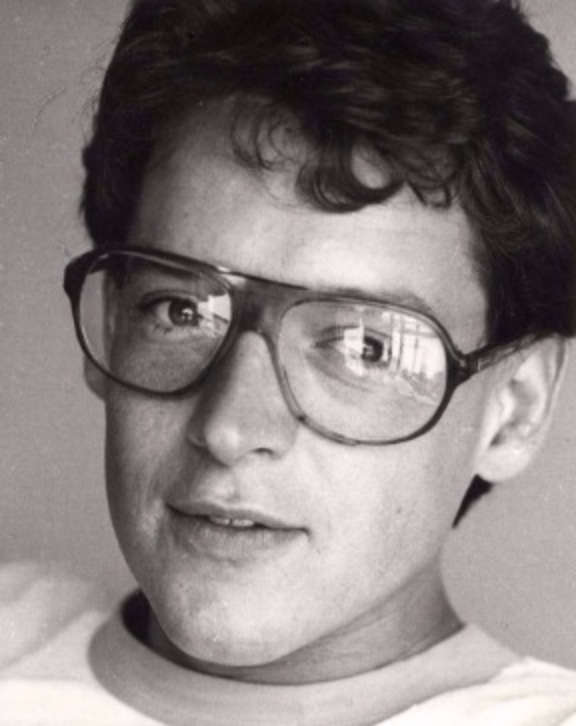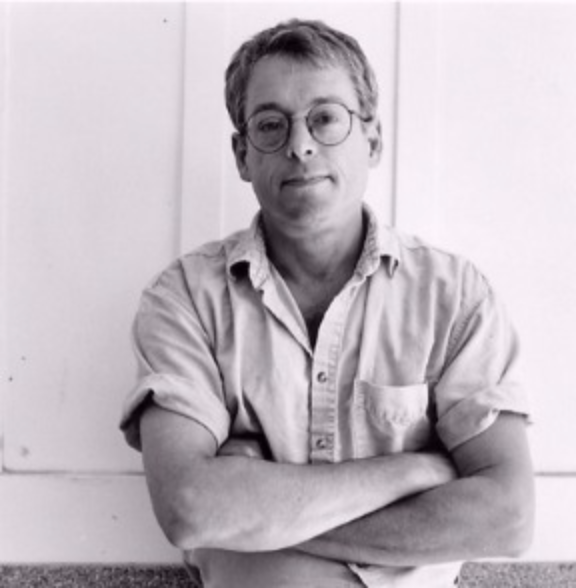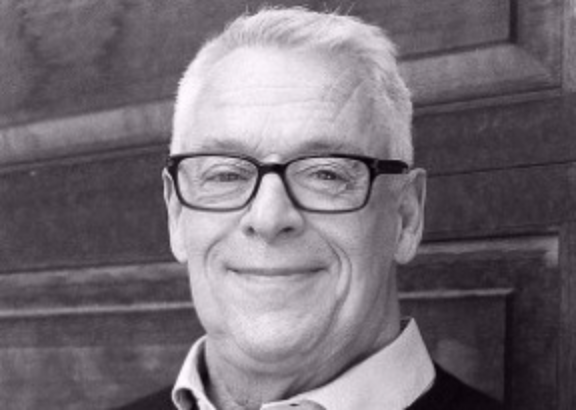An Intimate Interview with Cleve Jones
By Jeffrey Masters

Cleve Jones has spent more than four decades fighting for LGBTQ rights. He joined the gay liberation movement in the 1970s, was mentored by Harvey Milk, created the AIDS Memorial Quilt, and his memoir, When We Rise, is part of the inspiration for the ABC mini-series of the same name.
Cleve Jones: I got in an argument just recently with a young man in a club who just flat out denied that it had ever been illegal to be gay. He simply did not know that when I was his age, when I was just coming out, it was a felony. Every police department in every major city in this country had special sections whose sole purpose was to hunt down and imprison homosexuals—for consenting behavior between adults. That's the reality I came out in.
Jeffrey Masters: He didn’t know that?
CJ: Yeah. Another thing that bothers me is how little millennials seem to understand about what happened to our people during the HIV pandemic, the dark decade and a half before treatment became available. In my neighborhood, the Castro in San Francisco, we lost about 2,000 men a year for over a decade. It troubles me that young people don't know the history.
JM: Because when we grew up, pride parades were simply a fact of life.
CJ: I think it's probably indicative of how our culture views history in general. We don’t learn it and we don't learn from it. I want people to know about this time when the notion of “the gay community” was new. I think we were kinder to each other then. It was electric; it was very exciting, very romantic.
JM: The seeking out of community, whether you found it or created it, has been such a recurring theme in your life. And now many of these gay neighborhoods are going away.
CJ: It’s something I think about a lot right now. Wherever you look, where there's a defined gay neighborhood, it’s where very important things happen. It’s not just a place where there are bars—although bar life has always been an important part of our culture.
Look at all the amazing stuff that's come out of my neighborhood. It's no coincidence that the rainbow flag and the AIDS Memorial Quilt and the Sisters of Perpetual Indulgence all were born in the Castro. There’s that magic that happens when creative people—choreographers and filmmakers and dancers and DJs and painters—are all in that same area.
The queer and trans kids who’re fleeing Trump's America, where do they go? They can't come to the Castro. A little crappy studio apartment in the Castro's gonna cost you $2500 a month.
This is the reality that nobody's really quite talking about, that that community that’s given us so much is being threatened. We need these spaces and we need to figure out our next move.
JM: Not to ask a dumb question, what’s the solution there?
CJ: Oh, there's no easy solution. These are now some of the most expensive neighborhoods in the world. The district that gave us Harvey Milk is now inhabited increasingly by white heterosexual, cisgender millionaires.

JM: Our community’s always been skilled at problem-solving, when AIDS came about, absolutely, but I'm also thinking about the Butterfly Brigade, created to protect the streets.
CJ: That's a good point. I think today, people have this expectation that their problems are going to be dealt with by some existing, longstanding organization. We had to create everything from scratch. When the fag bashers came into the Castro from the suburbs to beat us up, the police didn't protect us. We had to defend ourselves. We created street patrols and bought walkie-talkies and learned self defense. We got pepper spray and beat the crap out of anybody that came into our neighborhood to cause trouble.
I still organize out of the bars. Whenever I'm planning a march or picket line or rally, my first stop is the Mix Bar on 18th and Castro. That's where I recruit my young people.
JM: That sounds radical today. When I go to the bar to meet friends, I sit quietly until they get there.
CJ: I don't know, your generation seems to have lost the art of cruising and eye contact.
Back then, our sexuality had been so repressed, so attacked. We were a sexual liberation movement then. That was the phrase we used. It was about tearing off the Puritan shackles of America and exploring our sexuality in a way that was very joyous and hot and exciting.
JM: I think it would have been very easy to leave that out of your book [When We Rise]. I was really happy to read about your sexual experiences, to be perfectly honest.
CJ: Well, I know my audience.
JM: I mean that seriously. Thank you. It's easy to paint these perfect pictures of people we look up to and it’s okay to know that they enjoy and have active sex lives.
CJ: It’s an important part of my story. It's an important part of who I am.
It wasn't just about the sex; it was about the relationships that came out of it. Most of my dearest friends were people like my friend, Marvin [Feldman]. I tried to make out with him and he said, "Girl, we're gonna be sisters." You'd meet someone, you'd go home, and okay, maybe it was good sex, maybe it was mediocre sex, but there was a connection and then you would become best friends forever.
JM: That’s a massive part of gay relationships that no one talks about.
CJ: It is. It's a big part of the way especially gay men live their lives.
JM: One of my favorite parts of your book had nothing to do with the movement. It was when you were in Greece and you stumbled upon this fire pit of Greek soldiers. No one spoke English. You end up rolling around with one of them in the sand and you write, “He held me close against his chest, breathing in my hair, speaking words I did not know but understood.”
CJ: It was wonderful. I liked hitchhiking. I had a lot of fun.

JM: It was pre-AIDS, so there's nothing to worry about, as far as you knew.
CJ: When you are able to connect with a stranger, under any circumstance, I think that's a wonderful thing. When he happens to be a hot Greek soldier and you're on a beach, it's pretty great.
For me, my sweet Ricardo committed suicide. I think I already knew in my heart that I would never do that because of the pain it would cause people who loved me. There were so many times I wanted to. So many times. So many times I'd thought it through, how to do it. When Ricardo did it, it was so devastating to me that I knew then I will never do that.
AIDS required us to collaborate in a new way. People had been talking about doing a march on Washington for years and years and years and years, but nobody could get the queens in each city to agree. Harvey's death created really the space for that first march to happen.
JM: Harvey Milk’s remembered as a hero in our community. Was he viewed that way while he was living?
CJ: Harvey was a complicated guy. What I want everybody to know about him, and especially younger people, was that he was in many respects an ordinary man. In my view, he was neither a genius nor a saint. His personal life was often a mess. He was a terrible business man, usually broke. He was very kind, very funny, and he could be a total bitch. He was the first adult to tell me that I had value as I was. He genuinely loved people and his city and was courageous, but his achievements are ones that I think we can all aspire to. Had he lived I believe he would have become our mayor. Would he have survived the pandemic? Who knows.
Certainly in his death, he gave us our first real collective martyr. We'd had thousands of martyrs, people who had been murdered and beaten to death, people who had taken their own lives, who drank their lives away or overdosed. We've had a lot of martyrs, but Harvey became that unifying symbol. Even that was being forgotten until the film.
JM: Are you saying that he became this saint figure because we needed a saint?
CJ: Yeah. You heard people say, "No, he's our Dr. King." Harvey would have just, I think, been baffled by that. I mean, he was a little shopkeeper on Castro Street who had a failing camera store. He had a temper and his personal life was tempestuous.
JM: Well, same. That can be said about a lot of people.
CJ: One of many terrible things about AIDS was that it disrupted the transmission of information from one generation to the next, because half of my generation got wiped out and those of us who survived, many of us don't want to talk about any of it because it's too painful still. Harvey’s memory was beginning to recede. A core group of what began as many people dwindled over the years to a very handful who were doing whatever we could to keep his name alive. Gus Van Sant and Dustin Lance Black changed that with Milk, and Sean Penn's portrayal, it unearthed his story in a way that was really important and powerful. I'm really grateful that it happened.
This interview has been edited and condensed. The full interview with Cleve is available on the podcast, LGBTQ&A.
Jeffrey Masters documents the stories of the LGBTQ community on the podcast, LGBTQ&A. @jeffmasters1